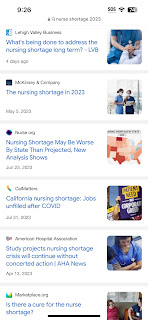There's a growing and obvious labour shortage in certain fields that all connect to one culprit. But we don't want be explicit about it.
 |
| And N95s help as well! |
As mentioned by 1GoodTern, a Guardian article came so close to saying it in this editorial:
"These days, staff shortages are causing problems across public services, above all in careers demanding high levels of personal interaction."
But that article's focus stuck to economic issues as if the sudden and widespread shortage is due primarily to pay levels or student debt despite it hitting professions with significant physical contact with many other people.
Biologist Arijit Chakravarty pointed out the connections more specifically yesterday:
"This point has been made before, but if you want to know what the future holds for long Covid, look to high-contact-rate professions. In the UK, the Guardian noted the shortage of workers specifically in this category. If you think of high-contact-rate professions in the US, ones where people are likely to come in contact with Covid, what are they? Childcare workers, bus drivers, nurses, pharmacists, prison guards, for example? So how’s the labor situation working out in these professions? Chronic and nationwide shortages in each of these categories, showing no signs of abating and in some cases, the worst that they have been since the beginning of the pandemic.
A simple google search for these categories throws up dozens of hits. It’s worth clicking through on some of the articles thrown up by these google searches. In each category, most of the articles focus on “post-pandemic” framing and invoke “special pleading” to explain why that particular category of workers is experiencing a shortage.
Of course, this is a common tactic, narrow the focus down to a single issue and then say “it’s complicated”. For any given shortage there could be many different explanations. But what explanation could possibly account for simultaneous labor shortages in multiple sectors? And why would high-contact professions be feeling the bite most of all? I mean, “software engineer shortage”, “software developer shortage” and “hedge fund manager shortage” don’t yield the same dire headlines, right?
We know that the labor market remains tight, unemployment remains “stubbornly low” despite the Fed’s best efforts to shrink it by effectively inducing layoffs, and we know that long Covid is at least one cause for the labor shortage. When it comes to long Covid, these facts are not in dispute: anyone can get Covid. More than once. Each round brings a nonzero risk of long Covid. Some long Covid patients take a long time to recover. We wrote a paper running the numbers on this scenario, around a year ago. TL; DR is that we would expect long Covid risk to track closely with contact rate.
The paper assumed that long Covid risk per infection was non-declining and that long Covid patients recovered slowly. We are still learning about these phenomena, so both those assumptions were likely off by a bit. It looks like long Covid risk declines- but only slightly upon reinfection, and it looks like long Covid recovery rates may be slower than what we assumed.
In either case, the labor shortages in high-contact professions support a model where lack of mitigations lead to long-term labor shortages in key professions. The problem is not fixable by gaslighting alone. No matter how many new nurses, bus drivers, or pharmacists you train, you’re going to burn through them at the increased attrition rate of the “new normal”.
The other piece of the story is personal. If you consider that people in low-contact rate professions get Covid fewer times a year (as predicted by our model), this lower risk of Covid (and long Covid) only means that it will take them a bit longer to end up in the same situation. The bus drivers are the canary in the coal mine. Long Covid is in everyone’s future under this “plan”. The “get infected for the sake of the economy” crowd is deluding themselves if they think they won’t be part of that human sacrifice.
This strategy is not sustainable. At some point, we have to invest in mitigation and suppression of Covid as a society."










No comments:
Post a Comment